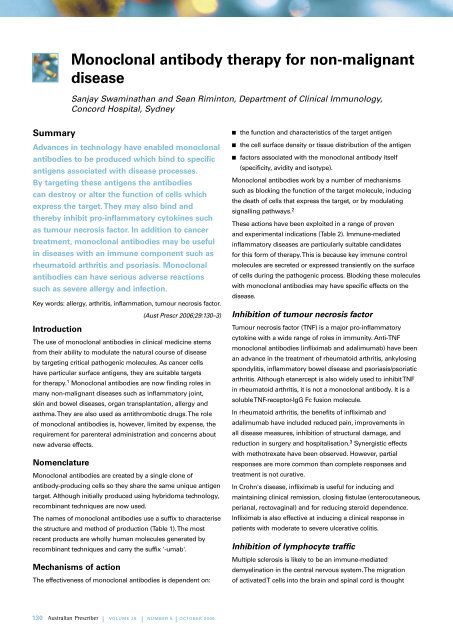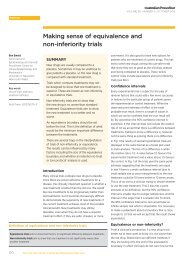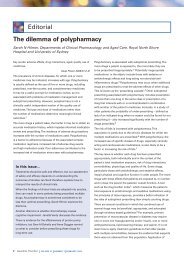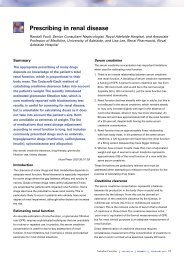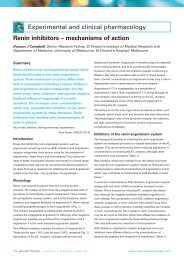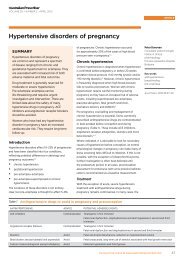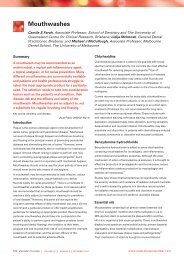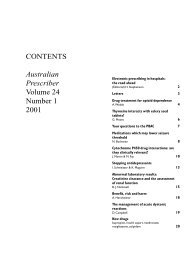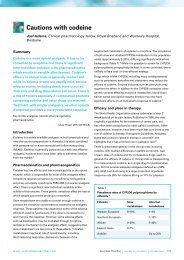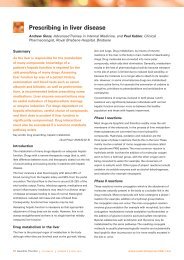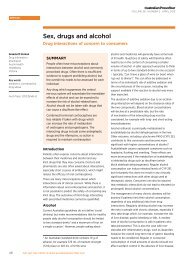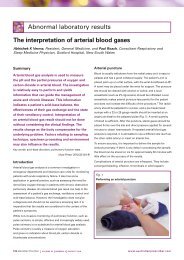download the full PDF issue - Australian Prescriber
download the full PDF issue - Australian Prescriber
download the full PDF issue - Australian Prescriber
You also want an ePaper? Increase the reach of your titles
YUMPU automatically turns print PDFs into web optimized ePapers that Google loves.
Summary<br />
Monoclonal antibody <strong>the</strong>rapy for non-malignant<br />
disease<br />
Sanjay Swaminathan and Sean Riminton, Department of Clinical Immunology,<br />
Concord Hospital, Sydney<br />
Advances in technology have enabled monoclonal<br />
antibodies to be produced which bind to specific<br />
antigens associated with disease processes.<br />
By targeting <strong>the</strong>se antigens <strong>the</strong> antibodies<br />
can destroy or alter <strong>the</strong> function of cells which<br />
express <strong>the</strong> target. They may also bind and<br />
<strong>the</strong>reby inhibit pro-inflammatory cytokines such<br />
as tumour necrosis factor. In addition to cancer<br />
treatment, monoclonal antibodies may be useful<br />
in diseases with an immune component such as<br />
rheumatoid arthritis and psoriasis. Monoclonal<br />
antibodies can have serious adverse reactions<br />
such as severe allergy and infection.<br />
Key words: allergy, arthritis, inflammation, tumour necrosis factor.<br />
Introduction<br />
(Aust Prescr 2006;29:130–3)<br />
The use of monoclonal antibodies in clinical medicine stems<br />
from <strong>the</strong>ir ability to modulate <strong>the</strong> natural course of disease<br />
by targeting critical pathogenic molecules. As cancer cells<br />
have particular surface antigens, <strong>the</strong>y are suitable targets<br />
for <strong>the</strong>rapy. 1 Monoclonal antibodies are now finding roles in<br />
many non-malignant diseases such as inflammatory joint,<br />
skin and bowel diseases, organ transplantation, allergy and<br />
asthma. They are also used as antithrombotic drugs. The role<br />
of monoclonal antibodies is, however, limited by expense, <strong>the</strong><br />
requirement for parenteral administration and concerns about<br />
new adverse effects.<br />
Nomenclature<br />
Monoclonal antibodies are created by a single clone of<br />
antibody-producing cells so <strong>the</strong>y share <strong>the</strong> same unique antigen<br />
target. Although initially produced using hybridoma technology,<br />
recombinant techniques are now used.<br />
The names of monoclonal antibodies use a suffix to characterise<br />
<strong>the</strong> structure and method of production (Table 1). The most<br />
recent products are wholly human molecules generated by<br />
recombinant techniques and carry <strong>the</strong> suffix '-umab'.<br />
Mechanisms of action<br />
The effectiveness of monoclonal antibodies is dependent on:<br />
130 | VOLUME 29 | NUMBER 5 | OCTOBER 2006<br />
■ <strong>the</strong> function and characteristics of <strong>the</strong> target antigen<br />
■ <strong>the</strong> cell surface density or t<strong>issue</strong> distribution of <strong>the</strong> antigen<br />
■ factors associated with <strong>the</strong> monoclonal antibody itself<br />
(specificity, avidity and isotype).<br />
Monoclonal antibodies work by a number of mechanisms<br />
such as blocking <strong>the</strong> function of <strong>the</strong> target molecule, inducing<br />
<strong>the</strong> death of cells that express <strong>the</strong> target, or by modulating<br />
signalling pathways. 2<br />
These actions have been exploited in a range of proven<br />
and experimental indications (Table 2). Immune-mediated<br />
inflammatory diseases are particularly suitable candidates<br />
for this form of <strong>the</strong>rapy. This is because key immune control<br />
molecules are secreted or expressed transiently on <strong>the</strong> surface<br />
of cells during <strong>the</strong> pathogenic process. Blocking <strong>the</strong>se molecules<br />
with monoclonal antibodies may have specific effects on <strong>the</strong><br />
disease.<br />
Inhibition of tumour necrosis factor<br />
Tumour necrosis factor (TNF) is a major pro-inflammatory<br />
cytokine with a wide range of roles in immunity. Anti-TNF<br />
monoclonal antibodies (infliximab and adalimumab) have been<br />
an advance in <strong>the</strong> treatment of rheumatoid arthritis, ankylosing<br />
spondylitis, inflammatory bowel disease and psoriasis/psoriatic<br />
arthritis. Although etanercept is also widely used to inhibit TNF<br />
in rheumatoid arthritis, it is not a monoclonal antibody. It is a<br />
soluble TNF-receptor-IgG Fc fusion molecule.<br />
In rheumatoid arthritis, <strong>the</strong> benefits of infliximab and<br />
adalimumab have included reduced pain, improvements in<br />
all disease measures, inhibition of structural damage, and<br />
reduction in surgery and hospitalisation. 3 Synergistic effects<br />
with methotrexate have been observed. However, partial<br />
responses are more common than complete responses and<br />
treatment is not curative.<br />
In Crohn's disease, infliximab is useful for inducing and<br />
maintaining clinical remission, closing fistulae (enterocutaneous,<br />
perianal, rectovaginal) and for reducing steroid dependence.<br />
Infliximab is also effective at inducing a clinical response in<br />
patients with moderate to severe ulcerative colitis.<br />
Inhibition of lymphocyte traffic<br />
Multiple sclerosis is likely to be an immune-mediated<br />
demyelination in <strong>the</strong> central nervous system. The migration<br />
of activated T cells into <strong>the</strong> brain and spinal cord is thought


